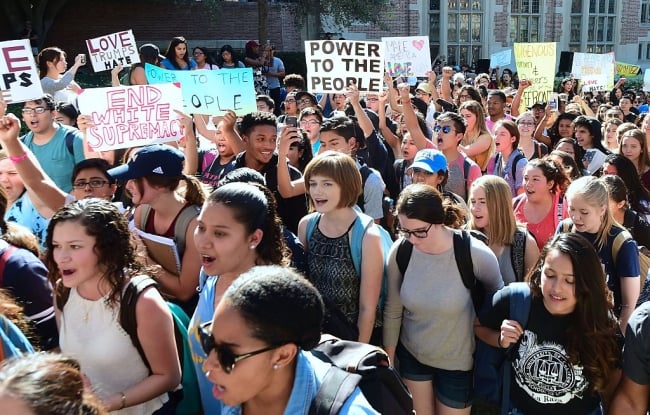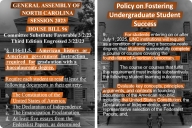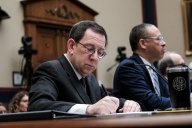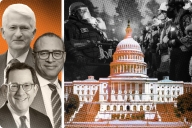You have /5 articles left.
Sign up for a free account or log in.

UCLA students march through the campus on November 10, 2016 to protest Donald Trump’s victory in the presidential elections. College leaders are anxious about how to handle possible protests related to the 2024 presidential election.
FREDERIC J. BROWN/AFP via Getty Images.
As the chaos of campus protests over the Israel-Hamas war reaches a fever pitch, the Constructive Dialogue Institute has released a guide to help higher education leaders manage their campus climates in preparation for the 2024 election season.
Being proactive, applying existing strategies and infrastructure to mitigate future election-related protests, and involving a wide range of stakeholders in the process, were among the key suggestions from the institute, which helps institutions and organizations foster communication across differences and build inclusive cultures.
Higher Ed ‘on the Ballot’
“No event is as effective at shunting communities into ‘us’ versus ‘them’ as a U.S. presidential election,” said the institute's guide, “Maintaining Campus Community During the 2024 Election,” which the organization released last week. “The 2024 election adds a unique challenge because higher education itself is on the ballot.”
Since the war began on Oct. 7, campus administrators have faced criticism from state and federal lawmakers, donors, students and faculty about how they’ve handled local responses to the Middle Eastern conflict. And according to various campus climate surveys, many pro-Palestinian and pro-Israel students alike feel unsafe.
All of that turmoil—in addition to the continued conservative crusade against diversity, equity and inclusion programs and frustrations about student debt—has pushed higher education issues to the forefront of the political discourse shaping November’s presidential race between former President Donald Trump and President Joe Biden.
Although political polarization is a standard feature of any election season, a cohort of 10 college and university presidents CDI interviewed last August “expressed anxiety about the upcoming election,” said Mary Aviles, insights and experience lead at CDI and co-author of the guide. “They were anticipating anxiety related to the outcome, polarization in terms of discussions and activities, and in some cases, outright hostility.”
Helping campus leaders address those concerns inspired CDI to spend much of this academic year creating a guide for the 2024 election.
Aviles and her team reviewed the available literature on campus climates during past elections. They also interviewed 21 college presidents, administrators, faculty and staff, who by that point were fully entrenched in trying to manage war-related campus protests.
When asked about their previous experience managing fallout from an election, the majority of campus leaders focused on the 2016 face-off between Trump and Hillary Clinton. (The guide notes that the pandemic shut down in-person learning at most campuses during the 2020 election, so protests weren’t as common that year.)
In the days after Trump’s election in 2016, campuses across the country reported heightened tension, protests and racist incidences.
College leaders “felt caught off guard,” and “because of that they didn’t think they’d be caught off guard in the same way this time,” Aviles said. “But they didn’t feel like they could do a good job of supporting people after the election. They just weren’t prepared for the emotional reaction people had, especially those from marginalized communities. They wanted to do better this time.”
Preparing for “aftercare” following the election or an election-related protest is one of the recommendations CDI outlined in its guide.
“They’re learning a lot about their conflict environment right now,” Aviles said. “They already have existing infrastructure that they’re using in current crises that they can apply to the election.”
Ohio Northern University offers one example of how this could work.
The university already uses EdSights, an AI-powered text messaging service, to periodically check in on students’ mental health. It analyzes responses and connects students with resources accordingly.
“Consider supplementing these existing practices to also evaluate the election’s impact, possibly adjusting the outreach frequency as November approaches,” the guide suggests. “Analyzing pre-election check-in results could inform priority post-election aftercare.”
A partnership between Linn-Benton Community College and neighboring Oregon State University offers a low-tech example.
Earlier this year, the two institutions collaborated to host an event focused on “restoring civic dialogue,” featuring Robert George, a conservative legal scholar, and Cornel West, a liberal philosopher. More than 1,000 people attended, and “participants’ enthusiastic response underscored a palpable demand for more such intellectually enriching occasions,” according to the guide.
“Many campuses already do some issue-based education and dialogue on campus,” Aviles said. “They can repurpose those same structures and activities to deal with election-specific issues.”
Proactivity is Key
Although the details of those strategies may vary, CDI suggests all leaders take a proactive approach to getting a plan in place before November 2024. Figuring all of that out now—and making campus policies clear—may help prevent or mitigate the campus clashes that have resulted in arrests, suspensions and expulsions of numerous student activists in the recent days, weeks and months.
“If you wait until what we’re experiencing now—which is upheaval—then you’re automatically on a responsive footing,” Aviles said. “Enforcement in the face of an active crisis can be perceived as very abrupt escalation. Whereas, if you have the luxury of addressing things more proactively, you have time to include the community and do a more thorough job of making the community aware of the policies.”
To maximize the power of developing a proactive approach to the 2024 election, CBI’s guide notes that while leadership is key to organizing a collaborative process, “both top-down and bottom-up approaches are necessary for cultivating positive campus climates.”
And just as campus protests over the Israel-Hamas war have tasked college administrators with balancing campus safety and free speech, the election will likely require the same considerations.
“The only answer is for colleges to protect speech, punish violence, ensure more than adequate security, and act swiftly to separate groups when tension flares,” Will Creeley, legal director for the Foundation for Individual Rights and Expression, said in a statement Monday following days of unrest at Columbia and Yale universities.
“There cannot be any sense whatsoever that violence will be tolerated. Campuses can meet all of those objectives—indeed, must—to preserve stability and defend truly protected speech amidst intense pressure.”








.jpg?itok=cjynvv9F)